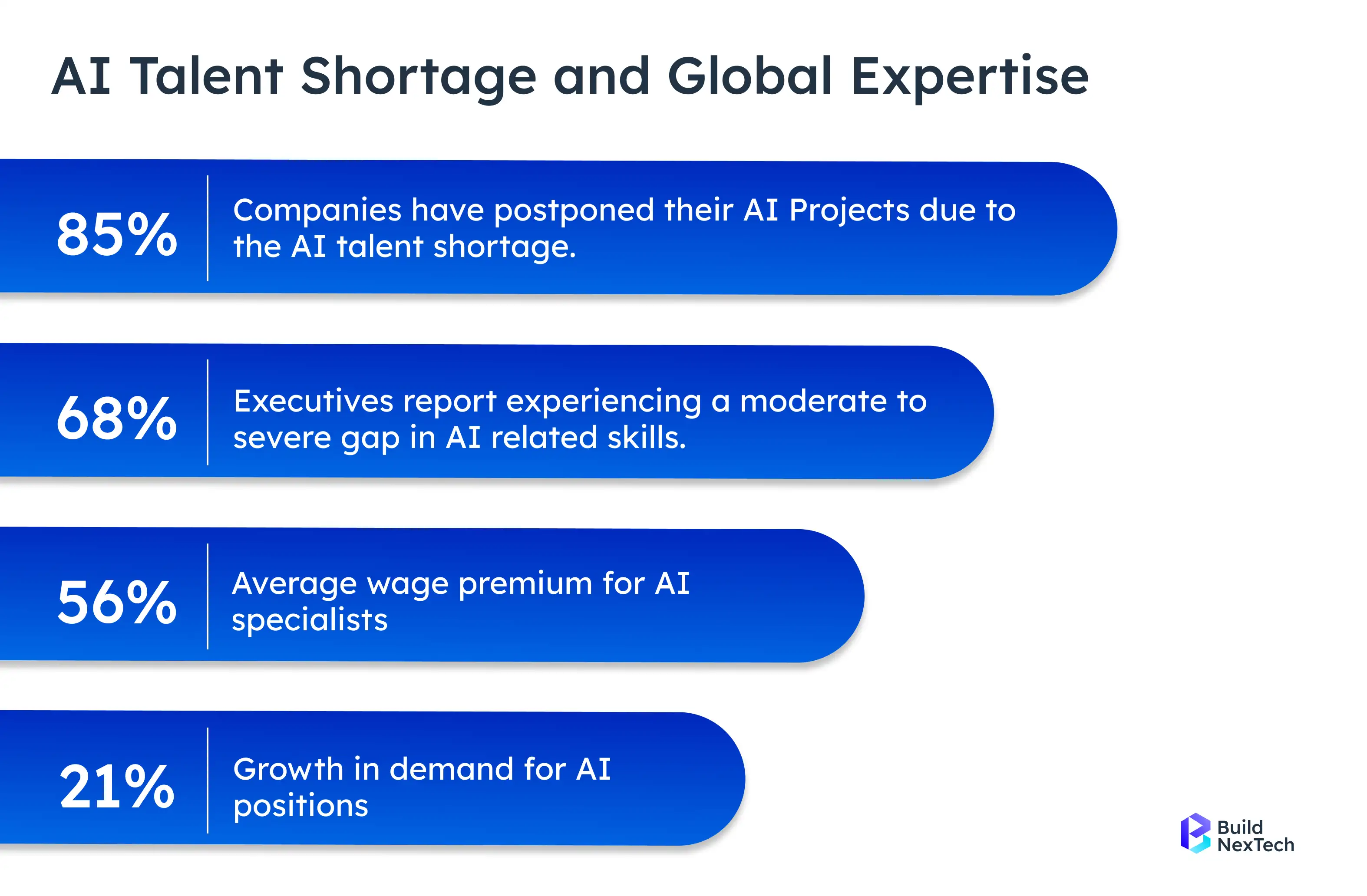Introduction
Digital transformation is speeding up in companies worldwide. Generative AI drives automation, smart decision-making, and innovation in large companies. By 2026, organizations will have arrived at a tipping point whereby outsourcing the development of Generative AI will be less about cutting costs, and more about accessing specialized skills, advanced technologies, and speed to execution.
As demand grows for machine learning models, AI software, and AI developers, companies will partner with top Generative AI firms. This helps them grow, innovate faster, and keep a strong advantage.
This research by Build Next Tech looks to explore the motivations for outsourcing continuing to shape the future of AI, and identifies the leading AI companies in 2026, changing the face of the corporation's innovation and digital strategy. Generative AI outsourcing is now a key driver of company innovation across industries.
Why Outsourcing Generative AI Projects Will Dominate in 2026
AI Talent Shortage and Global Expertise
Because skilled AI Data Scientists, ML engineers, and AI experts continue to have higher demand than supply, companies have realized they are together contributing to a global talent gap that nearly none of the in-house teams can fill.
Generative AI projects can be outsourced to take advantage of world-class talent in the centers of innovation across the U.S., Europe and Asia without incurring costs that a company would incur onboarding, training and maintaining a large technical infrastructure at home. These AI Systems further enhance enterprise efficiency by automating repetitive modeling and data processing tasks.
Key Drivers:
- Increasing need for AI experts: Across sectors, and particularly in innovative industries such as finance, health, and manufacturing, demand continues to outstrip supply for highly-skilled AI developers and ML engineers.
- Domain-specific Generative AI capabilities: Organizations must now have domain-specific Generative Artificial Intelligence competencies that include content generation, next-generation predictive analytics, and workflow automation to maintain competitiveness.
- End-to-end AI service delivery: Global organizations like Build Next Tech provide comprehensive AI solutions that cover the entire lifecycle from model training and testing to deployment and continuous optimization, ensuring trust, scalability, and measurable outcomes.
Organizations can be faster at scale, be more effective in resource use, and gain long-term value from their AI-enabled transformation when working with vendor-specialized providers.

Cost-Effective and Scalable Solutions
Organizations are increasingly turning to cost-effective AI and application development outsourcing alternatives that deliver scalable software environments with unchanged velocity for innovation. This trend also mirrors the rapid growth in app development outsourcing for businesses seeking faster digital rollouts.
These partnerships give organizations access to teams with many skills or pre-trained AI models. They also offer managed infrastructures. This support helps keep budgets, launch times, and focus on growth plans predictable.
The benefits include:
- Decreased infrastructure and licensing costs associated with large language models (LLMs) and AI platforms.
- On-demand access to scalable cloud environments, such as AWS AI, Google Cloud AI, and Microsoft Azure AI Studio.
- Simplified CI/CD pipelines for AI deployment, model testing, and security validation. The benefits of AI extend beyond automation
- This helps organizations to invest in AI innovation with care for costs and operational flexibility.
Access to Latest AI Models and Innovation
The Generative AI ecosystem is progressing faster than ever. Outsourcing partners continuously bring in the newest LLMs, computer vision, and multimodal AI models to help enterprises remain future-ready.
Major benefits include:
- Early access to cutting-edge models like GPT-5, Claude Next, and Gemini 2.
- Embedding AI copilot and agentic AI capabilities into workflows for enterprises.
- Outsourcing vendors consistently invest in R&D to keep innovation pipelines healthy, ensuring cost effective scalability for enterprises.
Enterprises that outsource AI development can save on on experimentation costs and accelerate their transformations by accessing AI innovations on the cutting edge.

Top 10 Generative AI Companies to Outsource Your Projects in 2026
Below are the top AI companies that enterprises can rely on to outsource Generative AI projects efficiently in 2026
1. OpenAI
OpenAI remains the undisputed leader in Generative AI development. Its suite of models, GPT-4 Turbo, DALL-E 3, and the emerging Sora video model, offers enterprises unmatched text-to-content and multimodal capabilities.
OpenAI’s API integration ecosystem supports custom deployments across industries, from customer service automation to synthetic content generation, making it the top outsourcing choice for innovation-driven enterprises.
2. Anthropic
Known for its safety-first AI approach, Anthropic develops Claude models optimized for enterprise AI agents and conversational applications.
Companies outsourcing to Anthropic gain access to models trained for compliance, interpretability, and ethical AI, critical for regulated sectors such as banking, healthcare, and education software development.
3. Google DeepMind
DeepMind, part of Google AI, continues to push boundaries in reinforcement learning and multimodal model development.
Outsourcing through Google Cloud’s AI platforms offers access to Search Generative Experience (SGE), Gemini LLMs, and AI-powered document processing tools.
Its fusion of AI & ML frameworks helps businesses enhance data analytics, predictive information, and customer experience.
4. Amazon Web Services (AWS) AI
AWS AI encompasses a full-featured offering for AI model training, data engineering, and enterprise AI deployment.
Services like Amazon Bedrock and SageMaker are designed to facilitate scalable experimentation, with their security controls allowing for compliance with data privacy regulations.
Outsourcing through AWS AI enables cost-efficient innovation and web-scale computing across sectors like e-commerce website development, healthcare, and gaming development company.
5. C3 AI
C3 AI is an enterprise AI application provider for predictive maintenance, industrial IoT software, and workflow automation.
Its model-driven architecture and AI integration frameworks make it a reliable partner for companies looking to outsource AI & ML-driven scalability of business operations.
C3 AI’s focus on measurable ROI and production-grade deployment appeals strongly to manufacturing and logistics clients.
6. IBM Watson AI
IBM Watson AI is a leader in Artificial Intelligence and remains at the forefront of AI-enabled customer service, data analytics, and AI consulting.
Customers can outsource to IBM Watson AI to access enterprise solutions like Watson Discovery and Watson Assistant for customer engagement enhancements and CX automation.
Its proven record in data security and bias testing reinforces confidence for regulated industries.
7. Infosys Nia
Infosys Nia can accelerate digital transformation in domains such as BFSI and banking software services and is well-suited for enterprises looking for domain automation for verticals.
The Nia platform supports AI strategy consultation, RPA co-deployability, and AI-powered staffing systems, making it ideal for digital-first business in BFSI, retail and telecom.
8. Salesforce Einstein AI
Einstein AI is fully embedded in the Salesforce ecosystem and transforms customer relationship management (CRM) through predictive analytics and AI-assisted recommendation chatbots.
Projects outsourced to Salesforce Einstein AI improve customer support, lead generation, and customer satisfaction and support brands in developing personalized, data-based engagement models.
9. Microsoft Azure AI Studio
Azure AI Studio provides a unified environment for AI development, deployment, and model governance.
Its integration with OpenAI Service, Copilot frameworks, and RAG systems supports AI-powered document processing, agentic AI & ML solutions, and LLM fine-tuning.
Outsourcing through Microsoft enables rapid scaling, data compliance, and access to a global innovation network.
10. Perplexity AI
As a powerful competitor in the Generative AI tools space, Perplexity AI combines search generation, knowledge retrieval, and multimodal interaction.
When enterprises outsource to Perplexity AI, they get access to AI agents that can provide answers in real-time and contextual insights, making it a preferred partner for content creation and BI automation for 2026.
Key Factors to Evaluate Before Outsourcing AI Projects
Technical Expertise and Portfolio
When selecting an outsourcing partner, review their experience in Generative AI model development, AI/ML frameworks, and cloud integration.
Evaluation checklist:
- Proven portfolio of AI deployments across industries.
- Expertise in data engineering, LLM development, and NLP.
- Compatibility with enterprise systems like SAP, Salesforce, or Microsoft Dynamics
Partnering with seasoned vendors such as Build Next Tech ensures alignment between business goals and technology capabilities.
H3- Security and Data Compliance
As organizations deepen their reliance on AI-driven systems, maintaining data security and regulatory compliance has become an absolute priority.
These are important things to think about.
- Adherence to standards such as ISO 27001, GDPR, and SOC 2.
- Secure API and data pipeline management.
- Built-in mechanisms for AI model bias testing and data masking.
Build Next Tech’s approach integrates AI ethics, governance frameworks, and security protocols, minimizing enterprise risk during outsourcing engagements.
Post-Deployment Support and Maintenance
Long-term AI success depends on continuous monitoring and optimization of deployed models.
Best practices include:
- Regular retraining of machine learning models to prevent model drift.
- Integration of AI copilot systems for real-time assistance.
- Scalable maintenance plans to address performance and cost efficient.
Enterprises partnering with Build Next Tech benefit from dedicated QA teams, test automation frameworks, outsource app support models, and performance testing pipelines that ensure sustained AI ROI.
Future of Generative AI and Business Innovation (2026 and Beyond)
AI + ML Fusion for Scalable Businesses
The integration of AI reasoning and ML automation defines the future of enterprise intelligence, where symbolic AI and neural models work together to create self-optimizing systems that enhance scalability and adaptability. This synergy enables predictive decision-making, dynamic automation, and cost-efficient innovation, redefining how enterprises expand across global markets.
AI-ML fusion enables predictive decision-making, dynamic automation, and cost-efficient innovation, redefining how enterprises expand across global markets.
Cost-Efficient Innovation Through AI
As enterprises continue to invest in AI strategically, these innovation ecosystems will empower them to scale products, services, and operations efficiently.
Emerging innovation examples:
- AI-powered recommendation engines are improving e-commerce conversion.
- Generative AI assistants are automating customer complaint resolution.
- AI-driven BI dashboards enabling faster, data-driven decisions.
Build Next Tech is investing heavily in these innovation frameworks, ensuring enterprises can translate AI potential into measurable business outcomes.
H3- The Rise of AI Partnership Ecosystems
The future of Generative Artificial Intelligence relies on collaboration and distributed innovation. A expanding network of AI partnership ecosystems linking cloud providers, model developers, and system integrators are emerging as the true backbone of global digital transformation
Key trends shaping this shift include:
- Agentic AI collaboration between human and intelligent machines that result in faster cycles of innovation.
- Growth of AI integration networks that allow for plug-and-play scalability through enterprise systems.
- Growth of AI consulting alliances that connect organizations with vendors that specialize in their unique AI strategies.
Build Next Tech builds connected systems. This helps customers move from testing AI to full company use. It creates long-term value and supports ongoing innovation.
Frequently Asked Questions
Which industries benefit most from AI development?
Industries such as healthcare, banking, retail, education, and manufacturing leverage AI for process automation, predictive analytics, and customer experience optimization.
What is the next biggest AI company?
Emerging firms like Perplexity AI and Anthropic are expected to lead in ethical, multimodal AI applications.
Which is the best AI in 2025?
In 2025, OpenAI GPT-4 Turbo and Anthropic Claude 2.5 dominated enterprise adoption due to scalability and performance.
How can AI improve scalability in business?
AI improves software scalability and efficiency. It does this by automating repeated tasks, using resources better, and giving data-based insights.
What are the different types of Generative AI models?
The primary types include text generation (LLMs), image generation (diffusion models), audio generation, video synthesis, and multimodal AI systems.
Conclusion
The Generative AI outsourcing wave of 2026 signals a paradigm shift in how enterprises build, deploy, and scale intelligent systems. From OpenAI’s innovation engine to Infosys Nia’s automation platform, each company contributes to a global network advancing AI & ML innovation.
Build Next Tech is an emerging global leader in AI development outsourcing, combining deep expertise in Generative Artificial Intelligence, machine learning, and enterprise automation. The company’s approach goes beyond conventional AI integration, focusing on creating scalable, secure, and cost-efficient AI ecosystems tailored to each client’s business model.
With specialized teams in LLM development, AI strategy consultation, workflow automation, and custom model deployment, Build Next Tech empowers organizations to accelerate innovation while maintaining full data control and compliance.
Its track record spans industries such as FinTech, EdTech, healthcare app development services, and enterprise SaaS..., helping global businesses translate AI-driven insights into tangible growth. In 2026, Build Next Tech continues to redefine how companies outsource AI development, transforming complexity into a competitive advantage. These cost-effective solutions have become central to AI-driven business models in 2026.
People Also Ask
Which industries benefit most from AI development?
Industries such as healthcare, banking, retail, education, and manufacturing leverage AI for process automation, predictive analytics, and customer experience optimization.
What is the next biggest AI company?
Emerging firms like Perplexity AI and Anthropic are expected to lead in ethical, multimodal AI applications.
Which is the best AI in 2025?
In 2025, OpenAI GPT-4 Turbo and Anthropic Claude 2.5 dominated enterprise adoption due to scalability and performance.
How can AI improve scalability in business?
AI improves software scalability and efficiency. It does this by automating repeated tasks, using resources better, and giving data-based insights.



























.webp)
.webp)
.webp)

